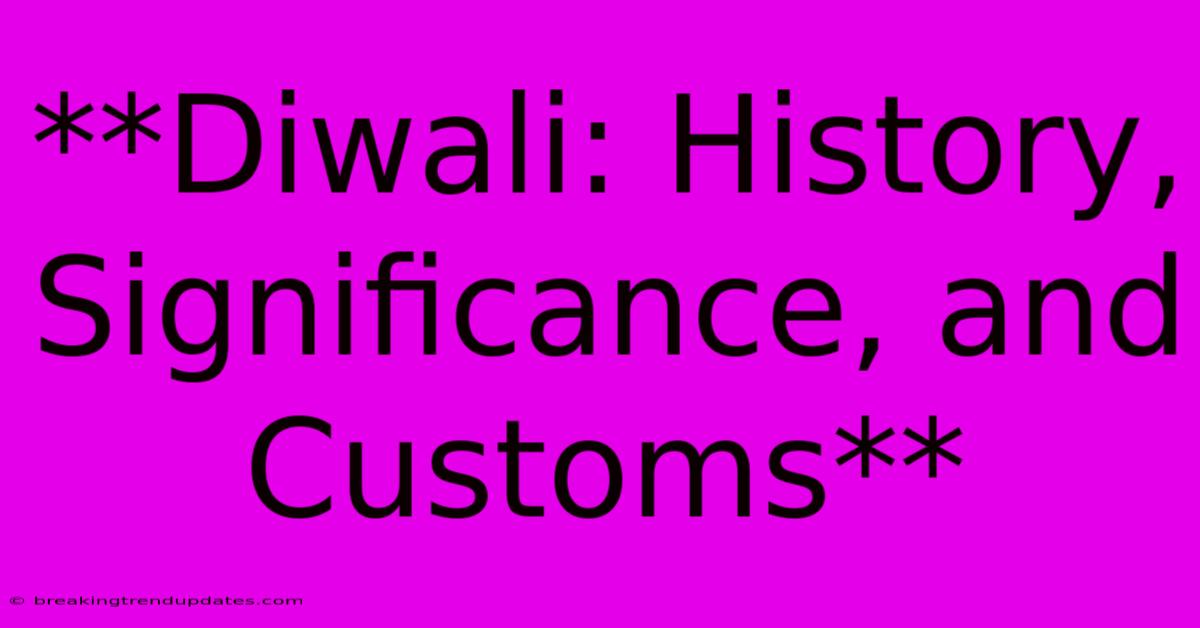**Diwali: History, Significance, And Customs**

Discover more detailed and exciting information on our website. Click the link below to start your adventure: Visit Best Website breakingtrendupdates.com. Don't miss out!
Table of Contents
Diwali: History, Significance, and Customs
Diwali, also known as the Festival of Lights, is one of the most important and widely celebrated festivals in India and among the Indian diaspora worldwide. It marks the triumph of good over evil, light over darkness, and knowledge over ignorance. This joyous festival is celebrated with great enthusiasm, fervor, and a myriad of traditions that have been passed down through generations.
The History and Significance of Diwali
The origins of Diwali are steeped in ancient Indian mythology and folklore. There are several legends associated with this festival, each highlighting a different aspect of its significance.
- The Return of Lord Rama: One prominent legend narrates the return of Lord Rama, the protagonist of the epic Ramayana, to his kingdom of Ayodhya after defeating the demon king Ravana. The people of Ayodhya welcomed Rama and his wife Sita with bright lamps, thus marking the beginning of Diwali. This story highlights the victory of good over evil and celebrates the return of the rightful king.
- The Story of Narakasura: Another popular legend revolves around the slaying of Narakasura, a demon king, by Lord Krishna and his consort Satyabhama. The people of Vrindavan celebrated this victory by lighting lamps and fireworks, a tradition that has continued to this day. This story emphasizes the triumph of light over darkness and the victory of righteousness.
- The Marriage of Lakshmi and Vishnu: Diwali is also associated with the marriage of Goddess Lakshmi, the goddess of wealth and prosperity, to Lord Vishnu, the preserver of the universe. This legend reinforces the idea of prosperity, good fortune, and auspicious beginnings.
Diwali Customs and Traditions
Diwali is celebrated over five days, each with its own significance and rituals.
- Dhanteras: The first day of Diwali is known as Dhanteras, which is dedicated to Lord Dhanvantari, the god of medicine and health. On this day, people purchase new utensils, jewelry, and other items to invoke wealth and prosperity.
- Naraka Chaturdashi: The second day is known as Naraka Chaturdashi, where people commemorate the slaying of Narakasura. They celebrate by bursting crackers and lighting lamps.
- Lakshmi Puja: The third day is the main day of Diwali, when people worship Goddess Lakshmi. They clean their homes, decorate them with diyas (oil lamps), and perform puja (prayer) to seek her blessings for wealth and prosperity.
- Govardhan Puja: The fourth day is Govardhan Puja, dedicated to Lord Krishna. People worship a miniature Govardhan mountain made of cow dung, commemorating Krishna’s protection of the people of Vrindavan from Indra’s wrath.
- Bhai Dooj: The final day is Bhai Dooj, which celebrates the special bond between brothers and sisters. Sisters apply tilak on their brothers' foreheads and pray for their well-being, while brothers give gifts to their sisters.
The Significance of Lights in Diwali
The most prominent symbol of Diwali is the diya, a small oil lamp made of clay. The diyas are lit throughout the five days, signifying the triumph of light over darkness and dispelling negativity. The act of lighting diyas symbolizes hope, joy, and the triumph of good over evil.
Diwali in Modern Times
Diwali remains a significant cultural and religious festival in the modern world. People around the world come together to celebrate the festival with traditional rituals, elaborate decorations, delicious food, and joyous gatherings. The festival serves as a reminder of the importance of hope, optimism, and the victory of good over evil.
Diwali is a celebration of life, prosperity, and togetherness. It is a time for families and friends to come together, share joy and happiness, and strengthen their bonds. The festival continues to be a powerful symbol of hope, light, and the enduring spirit of humanity.

Thank you for visiting our website wich cover about **Diwali: History, Significance, And Customs** . We hope the information provided has been useful to you. Feel free to contact us if you have any questions or need further assistance. See you next time and dont miss to bookmark.
Thank you for visiting our website wich cover about **Diwali: History, Significance, And Customs** . We hope the information provided has been useful to you. Feel free to contact us if you have any questions or need further assistance. See you next time and dont miss to bookmark.
Featured Posts
-
Liga 1 Line Up Barito Putera Vs Arema Fc Bo Kyeong Choi Main
Nov 01, 2024
-
Australian Second Tier League Gets New Format
Nov 01, 2024
-
Perth Wildcats Dont Underestimate The Wounded
Nov 01, 2024
-
Poitiers Affrontement Violent Cinq Personnes Blessees
Nov 01, 2024
-
Pko Bp Ekstraklasa Pogon Szczecin Vs Stal Mielec
Nov 01, 2024
